INTERNATIONAL PAPERS
Overseas Management in the English East India Company: A Study of the Tonkin Factory (1672-1697)
The 17th and 18th centuries witnessed a profound shift in global patterns of trade and in the managerial systems required to support this transformation. At the end of the 17th century, British overseas trade had been still built around woolen goods exported to Europe, Asia, Africa and the Americas.
The 17th and 18th centuries witnessed a profound shift in global patterns of trade and in the managerial systems required to support this transformation. At the end of the 17th century, British overseas trade had been still built around woolen goods exported to Europe, Asia, Africa and the Americas. Instead, it exported goods or treasure (silver or gold currency) to India, which were then exchanged for Indian goods. Central to all of Britain’s Asian trade was a company that was without peer among English firms in the 17th century: The English East India Company (hereafter the EIC or the Company). In the late 17th century, the Company experimented with small factories in East Asia to collect Japanese silver and Chinese and Asian commodities in the intra-Asian trade. The English Tonkin factory in what is now northern Vietnam was established and maintained for 25 years (1672-1697), worked as both an intermediary in regional trade flows and as a key market exchange point in the EIC’s East Asian trading chain. This subsidiary was under the control of both the Court of Committees in London and Councils in Bantam (before 1682) and then Madras (1685-1697).
This paper aims to investigate the “corporate governance” of the English East India Company (EIC) in the late 17th century through a case study of the Tonkin factory (1672-1697). The paper argues that London was dependent on using experienced staff and the EIC’s attempts to control overseas factories and agents were of little effect both due to the interventions of the Bantam Council (1672-1682) and the problems caused by adverse personnel selection in relation to the factors in Tonkin (1682-1697).
The paper draws upon British primary materials relating to the Tonkin factory to examine and analyses the EIC’s style of management in Tonkin (Vietnam) and Bantam (Java). Qualitative and comparative methods are applied to the analysis of reports, records and letters written by EIC staff. This study uses a mix of qualitative and quantitative research methods, including documentary research and statistical research from the EIC’s official sources. Those data and information are related to the EIC, English trade, global trade and the corporate governance of a holding company and of branch factories in a specific time period and research subject. The paper also uses analytical and interpretive methods to propose a model for the corporate governance process used by the EIC in relation to the Bantam Council and Tonkin employees.
This paper provides evidence from the Tonkin factory (1672-1697) to show the EIC’s governance in the perspective of the agency theory. The paper finds that the EIC faced principal-agent problems as it had difficulties administering its distant agents and subsidiaries in the 17th century. London was strategically weakened, both by the limiting power of regional headquarters and by its use of experienced factors. Before 1682, London failed to temper the Bantam Council’s influence, and there were serious internal conflicts and power struggles between English Tonkin employees seeking to improve their positions. After 1686, London successfully forced Madras to adopt a noninterventionist stance in Tonkin’s business, but it faced the problem of “adverse selection”.
The operations of the factory were beset by managerial problems. Its local officials tended to treat the Tonkin factory almost as if it was a personal fiefdom. Attempts to control their behaviour were, at best, mixed and partial. In explaining this failure, this study found that legal distance – that is, differences in law, institutions and cultural norms – was not a key factor. On the contrary, the Tonkin factory quickly developed close ties to the local population and its ruling elite. Rather, the authors argue, the failure of the Tonkin factory stemmed from a lack of professionalism among its staff and an inability to exert “control at a distance.” These problems highlight the gulf that often exists between the business opportunity and the requisite managerial resources and expertise needed to exploit that opportunity opportunities. In Tonkin, the EIC had a great business opportunity but a marked deficit of managerial expertise and control.
This study addresses the issue of self-determination and proper labor relations between employees, owners and management in a democratic society. Sharing inherently different personal interests to align these interests with a common purpose for the business's strategy is also very difficult. The Tonkin factory offers rich examples of the administrative issues faced by the EIC regarding both the struggle between shareholders in London and its regional headquarters, and conflicts between its overseas employees for a higher position. Moreover, overseas agents’ friendship and kinship connections in London, and with other factors, especially those in Asia, explain how they gained knowledge and created influence on the ground in Asia.
Originated from
Tran, N. D., Dinh, P. H., Nguyen, D. H. U., & Nguyen, V. V. (2023). Overseas Management in the English East India Company: A Study of the Tonkin Factory (1672-1697). Journal of Management History, 29(2), 305-324.
https://www.emerald.com/insight/content/doi/10.1108/JMH-04-2022-0010/full/html
AUTHOR FROM VNU UNIVERSITY OF ECONOMICS AND BUSINESS
PhD reseacher - MA. Dinh Phuong Hoa graduated with a Master’s degree in International Human Resource Management from the University of Huddersfield - UK, and currently teaching at the Department of Human Resource Management at School of Business Administration, VNU University of Economics and Business. The author has published articles in prestigious international journals and international conferences such as the Journal of Management History - Emerald Publishing, ICECH... Her main research directions include international human resource management, talent management, training and development, and corporate governance.
OTHERS
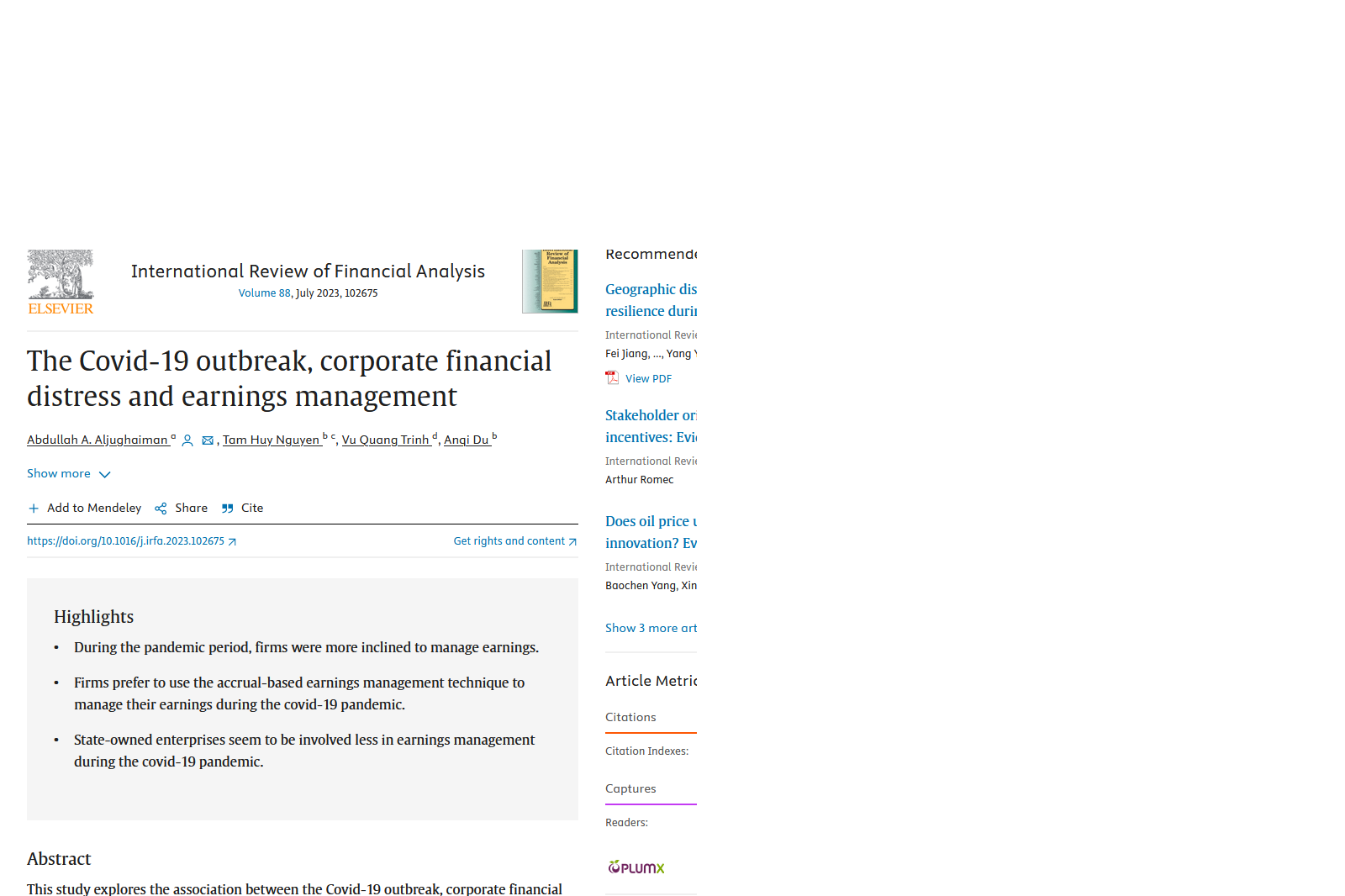
The COVID-19 Outbreak, Corporate Financial Distress and Earnings Management
This study explores the association between the COVID-19 outbreak, corporate financial distress and earnings management practices in China. We investigate ...
More details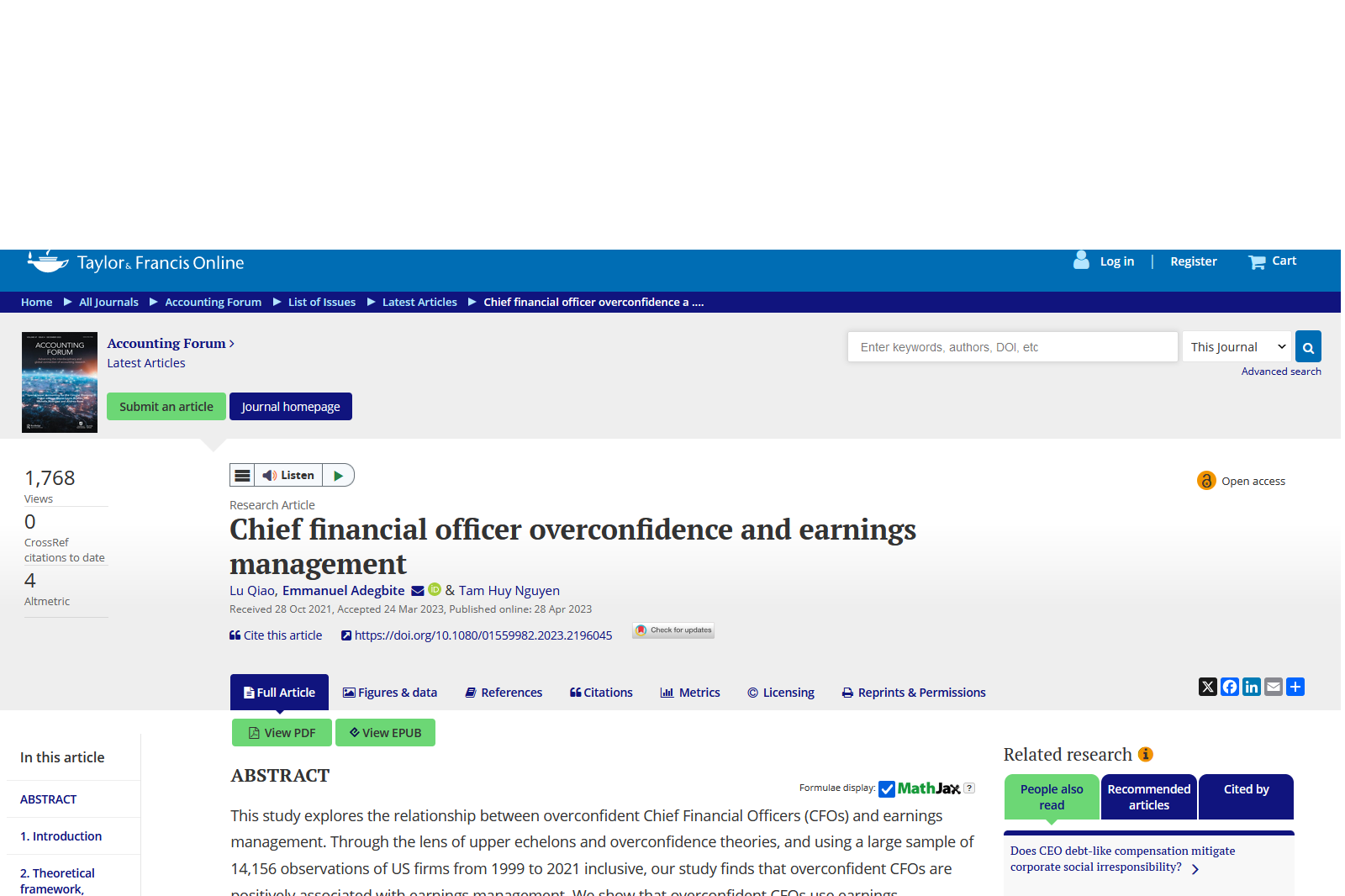
Chief Financial Officer Overconfidence and Earnings Management
This study explores the relationship between overconfident Chief Financial Officers (CFOs) and earnings management. Through the lens of upper echelons ...
More details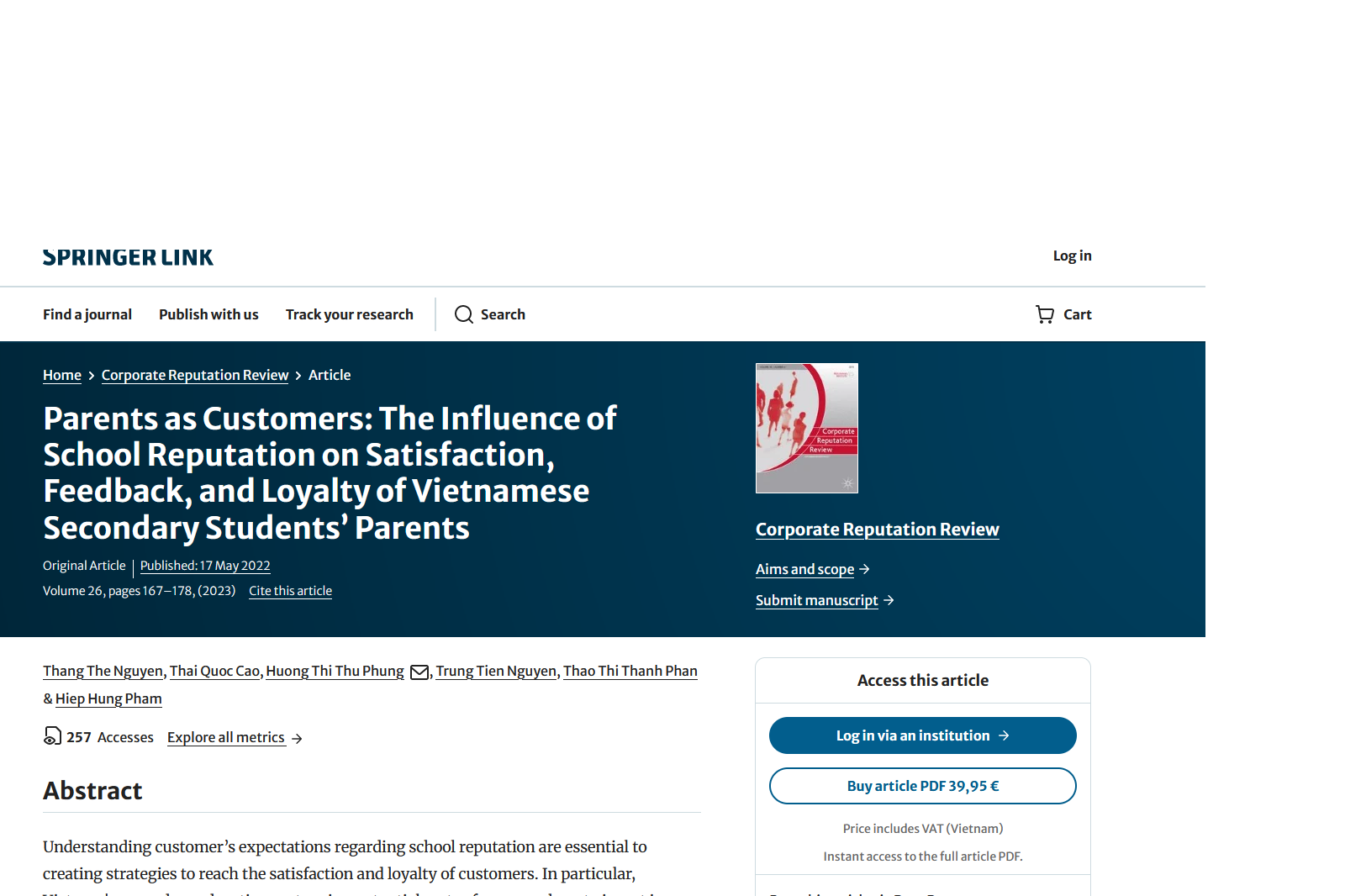
Parents as Customers: The Influence of School Reputation on Satisfaction, Feedback, and Loyalty of Vietnamese Secondary Students’ Parents
Understanding customer’s expectations regarding school reputation are essential to creating strategies to reach the satisfaction and loyalty of customers. ...
More details
UEB's Articles Published in International Journals in 2023
We are pleased to introduce the list of articles published in international journals by UEB’s staff and lecturers in 2023 (September).
More details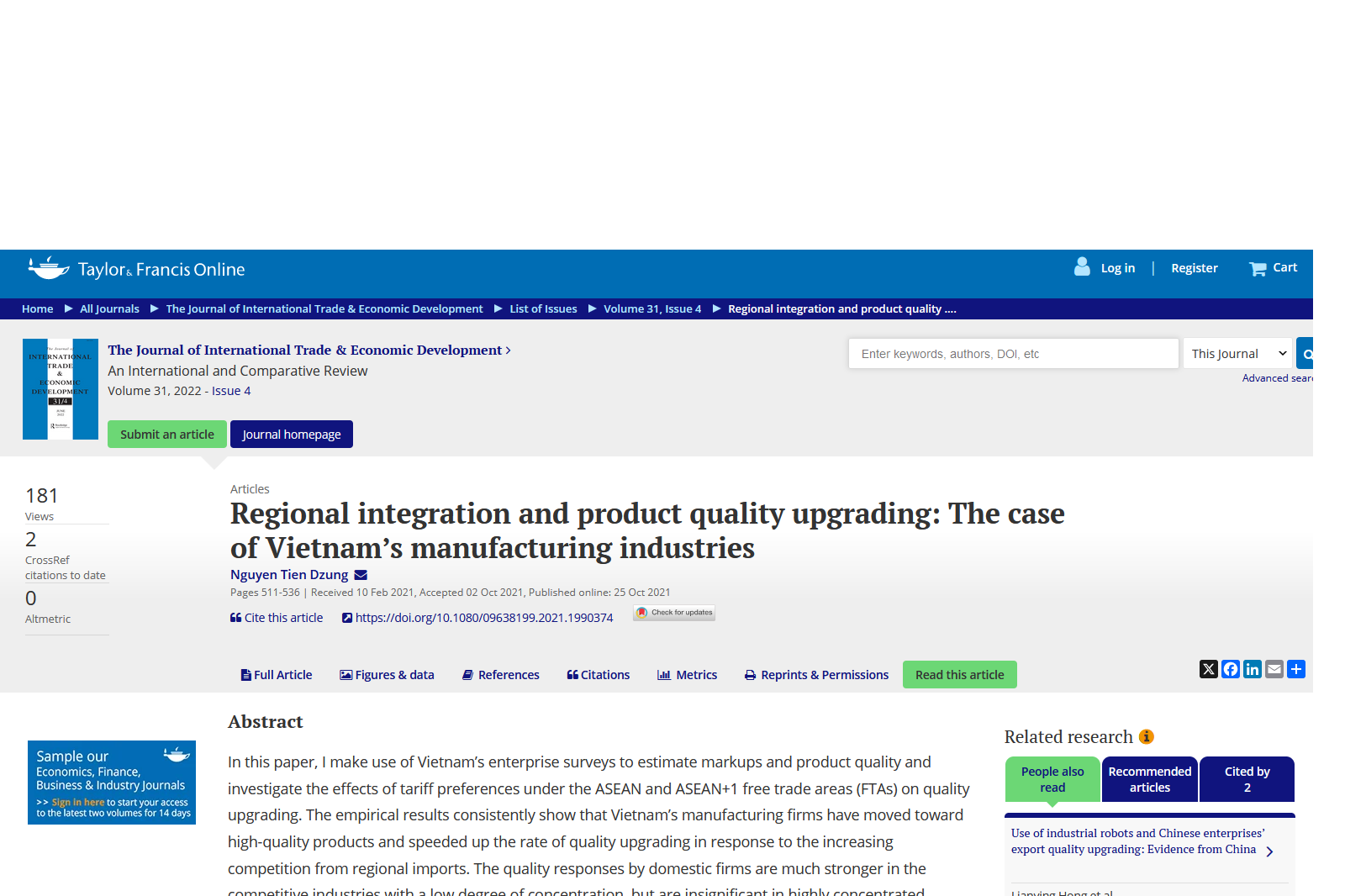
Regional Integration and Product Quality Upgrading: The Case of Vietnam Manufacturing Industries
Trade and competition have been extensively studied in Vietnam and abroad. There has been a large and increasing number of theoretical and empirical studies ...
More details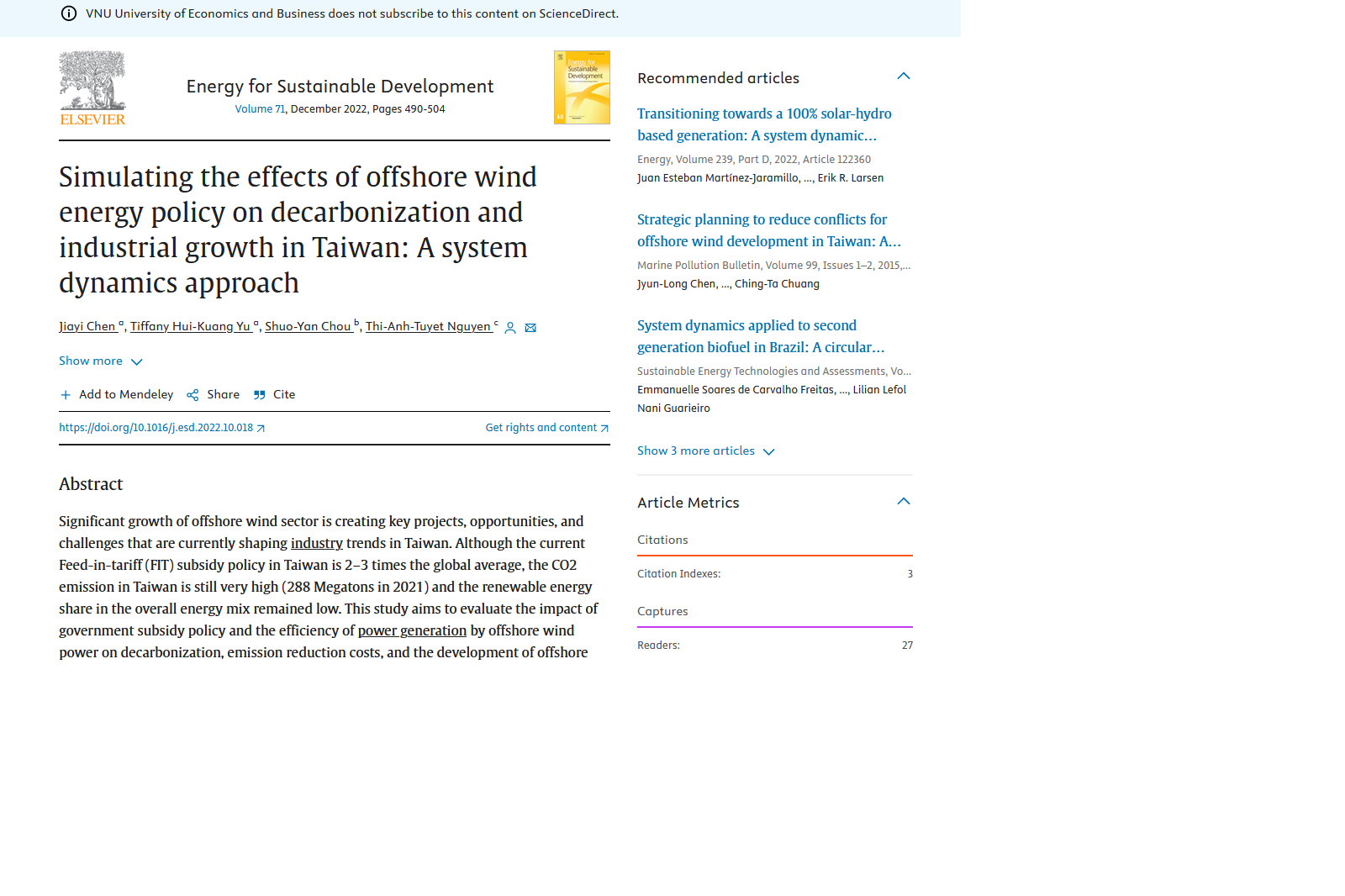
Managing Bank Performance under COVID-19: A Novel Inverse DEA Efficiency Approach
The evolution of the COVID-19 pandemic is highly unpredictable; however, its impacts are limited to neither a single sector nor a single country. This ...
More details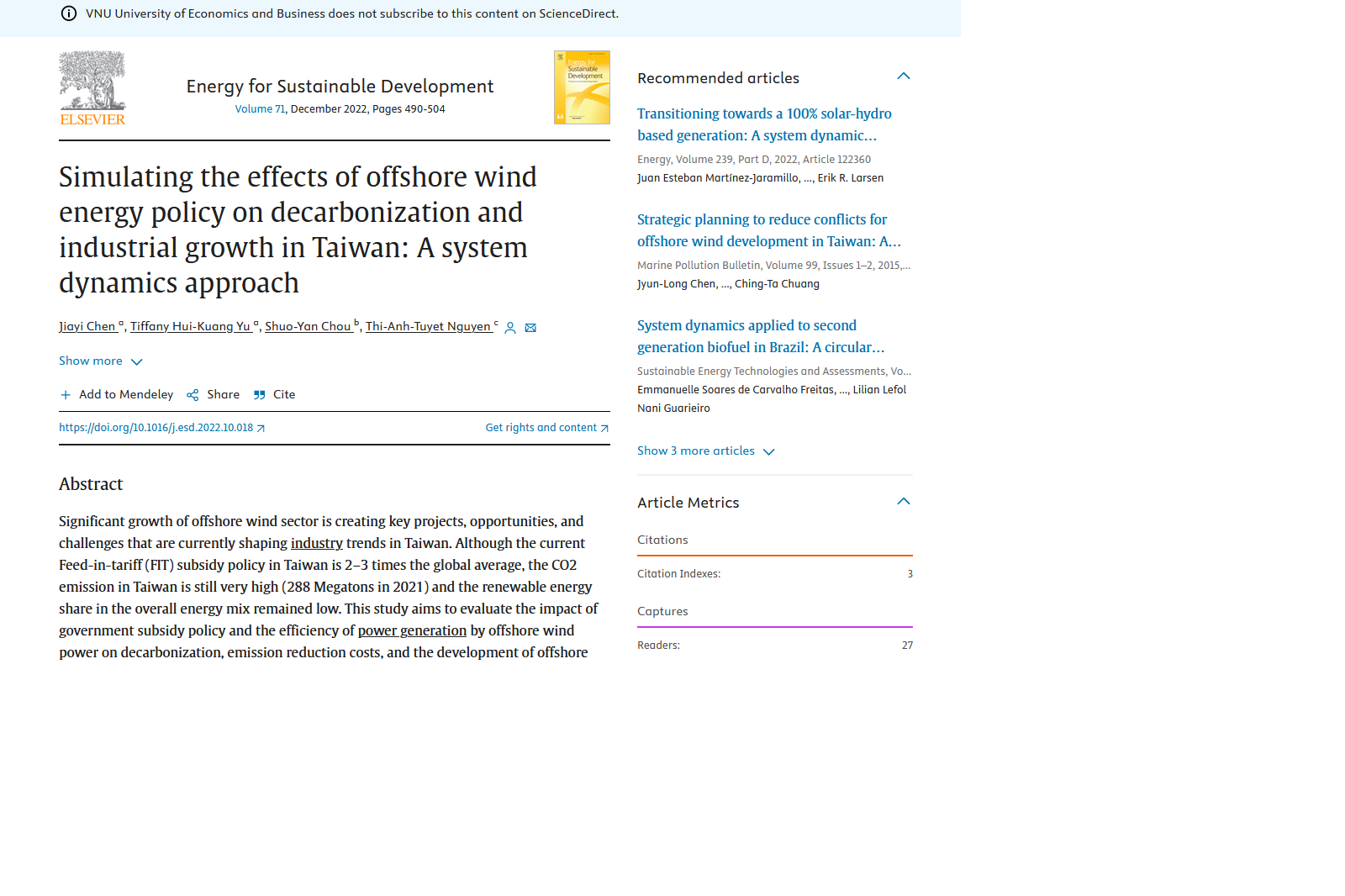
Simulating the Effects of Offshore Wind Energy Policy on Decarbonization and Industrial Growth in Taiwan: A System Dynamics Approach
Significant growth of the offshore wind sector is creating key projects, opportunities, and challenges that are currently shaping industry trends. Countries ...
More details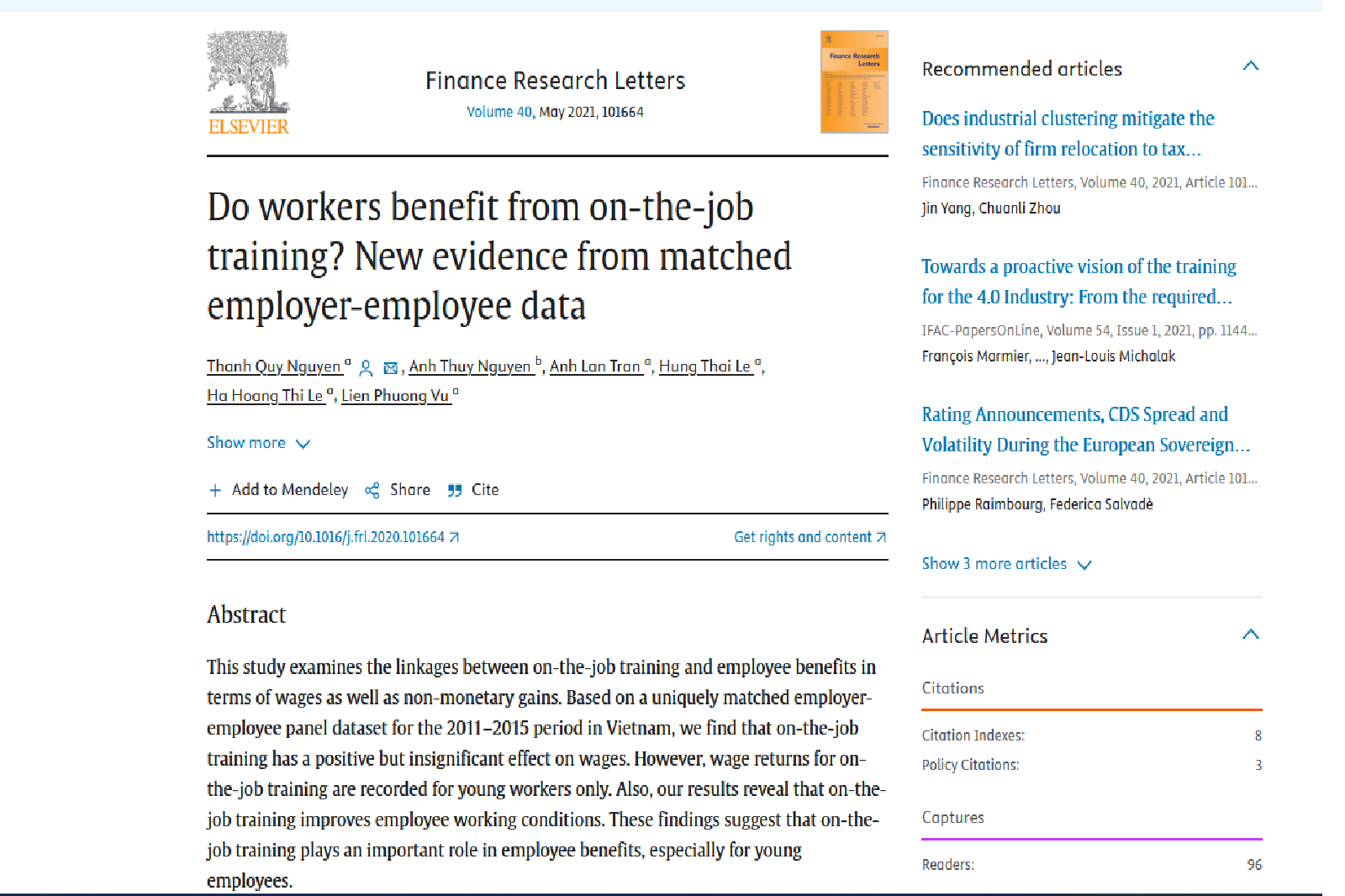
Do Workers Benefit from On-the-Job Training? New Evidence from Matched Employer-Employee Data
Although there has been extensive research on the benefits of education, few studies have examined how on-the-job training impacts wages. The research ...
More details
